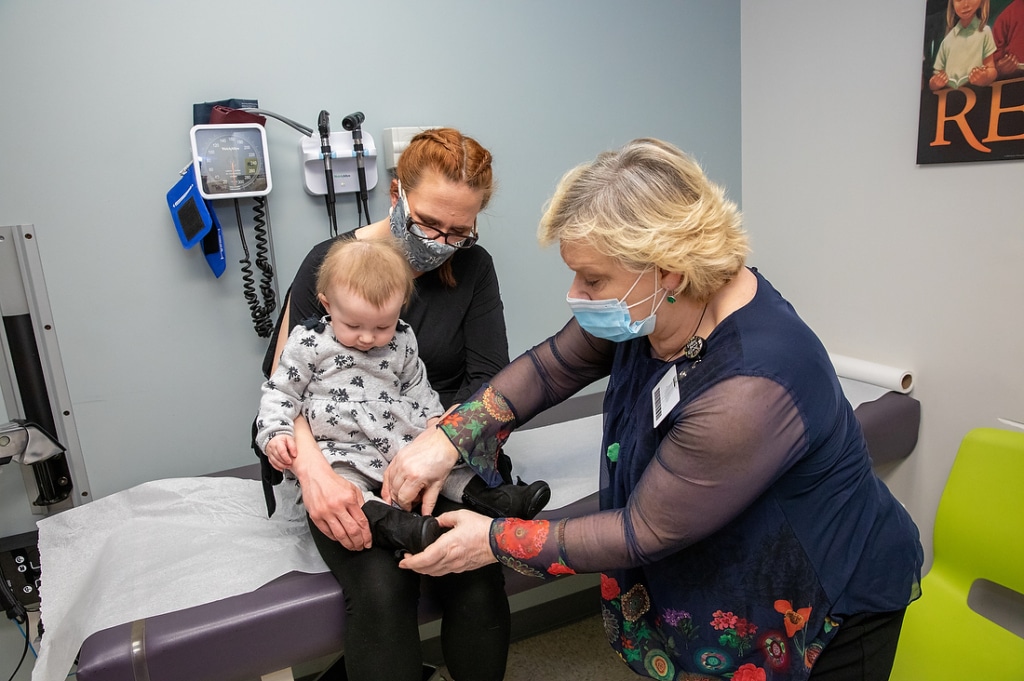Fact: There are over 100 HealthySteps Sites in
New York.
Home/Resources/Infant and Early Childhood Mental Health/From Alleviating the ‘Mental Load’ to Addressing Intergenerational Trauma: How HealthySteps Supports Maternal Health
From Alleviating the ‘Mental Load’ to Addressing Intergenerational Trauma: How HealthySteps Supports Maternal Health
See how HealthySteps supports maternal health as part of transforming the promise of pediatric care.

Trigger warning: This article discusses domestic violence and sexual assault.

Bernadette McDaniel, MSW
Bernadette has over 23 years of experience in mental health, working in various care settings. In 2017, she became the first HealthySteps Specialist in New York’s Capital Region and has served as a HealthySteps Ambassador. She supports families with early intervention, developmental resources, and pediatric care follow-ups, collaborating with organizations to assist those facing domestic violence, homelessness, and substance use disorder. Bernadette is also a Board Member of the nonprofit organization, Things of My Very Own, where she helps support victims of domestic violence and sexual assault. She finds joy in helping children grow and empowering parents.
For the past eight years, Bernadette McDaniel has been supporting families as a HealthySteps Specialist at Ellis Pediatrics. She gives us a peek into the pediatrician’s office to showcase her work and the impact that HealthySteps makes each day.
HealthySteps offers support during this emotional roller coaster we call motherhood.
Meeting moms with a nonjudgmental, supportive approach creates space for trust and information sharing.
Maternal health is fragile. The emotional ups and down often can have a mother wondering and questioning, “What is going on?,” “Why aren’t I happy with my newborn?,” “Why am I so sad all the time?,” “Why is motherhood so hard?,” and “I feel so overwhelmed!”
Mothers in the program have told us that having a voice in their corner becomes invaluable. A simple text message to their HealthySteps Specialist can alleviate stress and anxiety, expedite appointments to see the pediatrician, help coordinate transportation, specialist follow-up, and even assist in finding food or clothing if a family is in need.
Regularly screening moms for maternal depression is a Core Component of HealthySteps. This helps identify and open the door for discussion about the challenges a mom may be facing and helping connect to services and support.
Bernadette McDaniel
HealthySteps is closing gaps in maternal mental health screening.

Many mothers are literally ‘left holding the baby.’
The inability to afford essentials like food, formula, diapers, and clothing can push a mother into a state of emotional distress and anxiety. When combined with the hormonal shifts unique to childbirth, this creates a perfect storm.
A mother’s mental health before pregnancy, past trauma, and a high Adverse Childhood Experiences (ACE) score further complicate this reality. Many mothers stop taking medication for anxiety or depression during pregnancy, and returning to a stable baseline takes time.
On top of these personal challenges, some mothers may be responsible for managing their child’s behavior at school, navigating custody and visitation, and handling child support issues. They juggle endless school meetings, court appearances, and doctor’s appointments, all while their own health—both mental and physical—takes a back seat. Even postpartum checkups are frequently overlooked. When a mother is in survival mode, prioritizing mental health screenings or therapy is nearly impossible.

Research has shown that specific community supports and treatment are extremely effective in improving perinatal mental health outcomes.
It takes work to break the cycle.
A significant number of families in our practice are led by single mothers, many of whom have histories of childhood trauma, domestic violence, or sexual assault—often at the hands of their child’s father.
Women are disproportionately affected by these forms of abuse, with 1 in 4 experiencing physical violence compared to 1 in 7 men.
The trauma from domestic violence and sexual assault can affect trust, self-esteem, partner choices, and self-empowerment, creating a cycle that can be hard to break. Through empathy, education, and trauma-informed care, we help mothers address the root causes of toxic relationships and break the cycle of intergenerational trauma.
Through this approach, mothers can reclaim their sense of self, embrace self-care, and build healthier relationships. A mother who prioritizes her own well-being is more present, less reactive, and more attuned to both her children and herself.
As a HealthySteps Specialist, I recognize that understanding the roots of toxic stress and trauma is crucial for mothers aiming to break free from these cycles.
bernadette mcdaniel
By providing education and support, we empower mothers to comprehend how past traumas influence current behaviors and help them find the tools to address it—ultimately, enabling them to make positive changes for themselves and their children.
Involving parents and caregivers in every step of their child’s treatment sets families up for success.

Next Up
Go to Next Resource
distillation
Maternal Mental Health and Prenatal Brain Development: A Proven LinkVarious factors can contribute to poor maternal mental health and research shows that impacts babies even before they are born.

